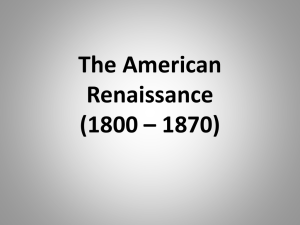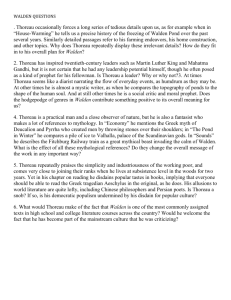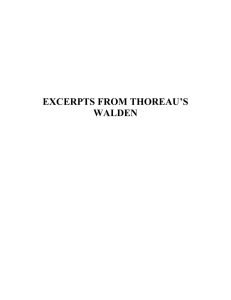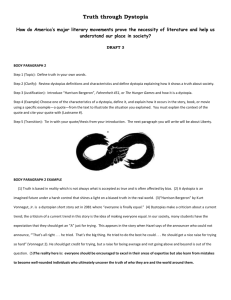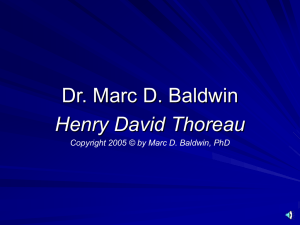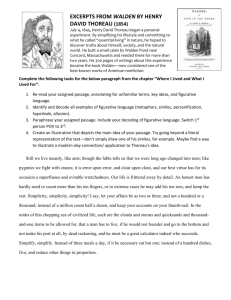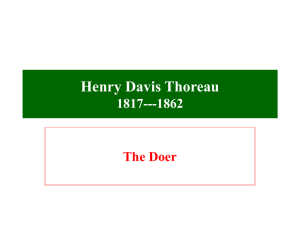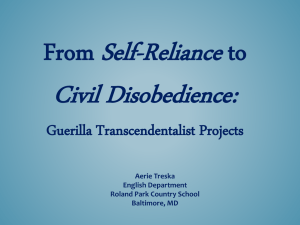Henry David Thoreau
advertisement
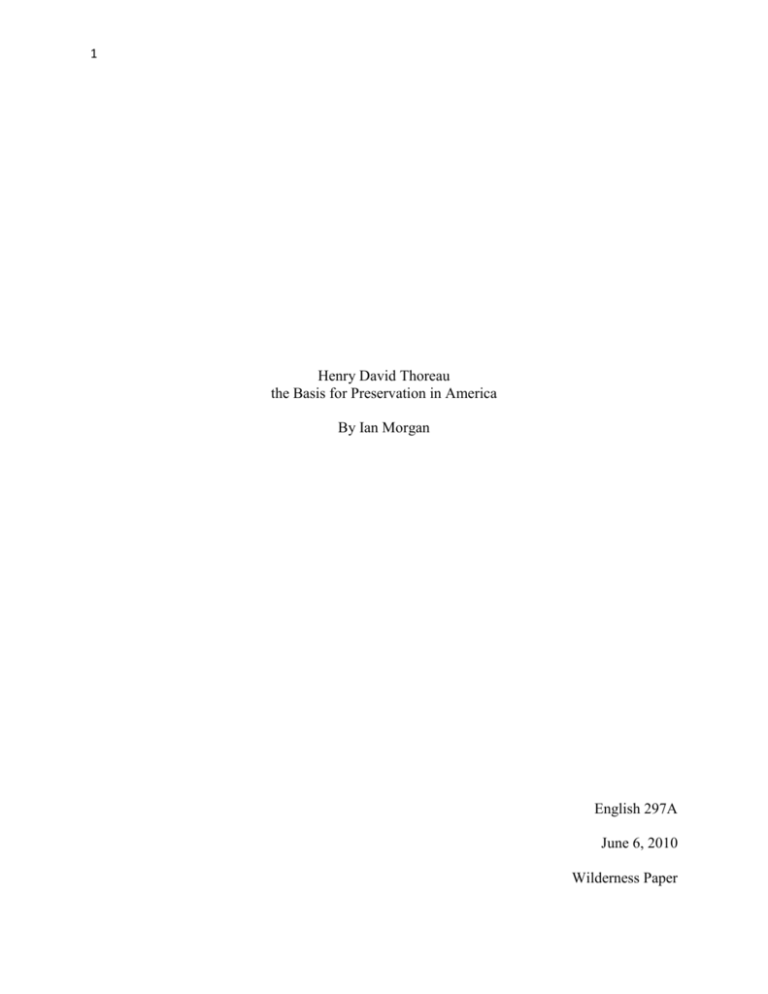
1 Henry David Thoreau the Basis for Preservation in America By Ian Morgan English 297A June 6, 2010 Wilderness Paper 2 The preservationist movement in the United States has featured numerous schools of thought and opinion that have framed the issue in time. At least since the introduction of Europeans to the New World, the subject of wilderness has been a source of intrigue and controversy, constantly being redefined by both pioneers and intellectuals alike. Among the most prominent voices on the subject came from the Transcendentalists of the mid-nineteenth century; moreover, the preeminent Transcendentalist, Henry David Thoreau, provided a perspective unlike any before on the burgeoning issue of wilderness appreciation and preservation. Roderick Nash’s book Wilderness and the American Mind analyzes the progression of the conservation movement in America, paying particular attention to leaders such as Thoreau, John Muir, and Aldo Leopold. Among these men, Thoreau stands out. Thoreau created a basis for intellectual thought about wilderness by expanding the typical romantic appreciation into the spiritual medium of Transcendentalism; furthermore, Thoreau’s focus on the value of nature, instead of simply the beauty, provided an intellectual platform for later arguments in defense of preservation; finally, Thoreau’s writings have proven timeless as his ideas persist as thoughtful insights on subjects ranging from ecology to the importance of balance. Thoreau’s conservationist legacy is foremost tied to his transcendental beliefs. Following the guidance of his mentor, Ralph Waldo Emerson, Thoreau embraced the New England wilderness utterly unlike his Puritan predecessors. Whereas early Puritan settlers feared the forest as a place of inherent evil, as shown by Nathaniel Hawthorne’s short story “Young Goodman Brown,” Transcendentalists viewed the wild as a direct connection to the divine. Transcendentalism is the belief that while man may be “rooted… to the material portion” of the world, “his soul gave him potential to transcend this condition” (Nash 85). This fresh 3 perspective implied that man had the capacity to achieve divinity through wilderness. Just as, to a Catholic, a cathedral represents god’s awe-inspiring capacity, so did wilderness to the Transcendentalist. However, this viewpoint was in direct contrast to the belief held widely by the Puritans and their descendants. Represented in the works of Cotton Mather and John Bunyan, among others, wilderness to the American Pilgrim was “the symbol of anarchy and evil to which the Christian was unalterably opposed” (Nash 34). The wilderness represented savagery, “wildmen”, and the “absence of restraint” that could spoil the souls of men (Nash 29). The sensibilities of the Puritans were ultimately passed down to the next generation of wildernessopposed New Englanders. Hawthorne was a contemporary of Thoreau, writing almost two hundred years after the initial Puritan colonies at Plymouth Rock, yet his works depict distinctly Puritan themes of the inherent evilness of the forest (Nash 40). It was in this environment that Thoreau and other Transcendentalists introduced an alternate understanding of wilderness. They posited that wilderness was not a place of moral failure, but actually that “one’s chances of attaining moral perfection and knowing God were maximized by entering wilderness” (Nash 86). Untouched by the hands of men, wilderness represented God’s unaltered work. The effect of this shift in thought was monumental in the plight of conservationism. Previously, the most flattering accounts of wilderness had been lofty Romantic praise of beauty and of man’s ability to conquer those unchartered lands. However, Thoreau provided a basis for spiritual value rather than simply appreciation. By literally putting his faith in nature, Thoreau turned wilderness from a boundary for humanity to a realm. Unlike ever before, Americans were beginning to view the great western wilderness as an asset in and of itself worth holding on to. 4 Indeed, beyond his spiritual guidance, Thoreau provided applicable insight into the value of wilderness. As a writer and philosopher, he never underestimated the inspiring power of nature as a release from civilization. His stay at Walden Pond outside of Concord is among the most famous such excursion in American literature. Intent to “live deliberately”, Thoreau used his time in a wilderness induced isolation to “play life” (Nash 90). On his own he found the familiar Romantic inspiration that allured so many of his contemporaries. However, Thoreau was always one step ahead. He recognized the wilderness as a finite place that not only had revitalizing powers, but sustaining effects as well. The natural world contained the “rawmaterial for life” (Nash 88). He lamented the destruction of forests, going so far as to present an initial plea for “national preserves… for inspiration and our own true recreation” (Nash 102). Always concerned with the soul, Thoreau constantly reminded us to “be the Lewis and Clark… of your own streams and oceans; explore your own latitudes” (Nash 88). Without wilderness, however, none of this can be attained. Man, according to Thoreau, could not afford to lose the wilderness because it kept “the spark of the wild alive” (Nash 88). Unfortunately, Thoreau’s ideas were largely ignored during his time. Although well regarded in small circles, Thoreau’s works did not receive the publicity afforded to other naturalists until long after his death (Nash 160). Thoreau is typically credited with shaping the initial ideas of influential conservationists like John Muir, Aldo Leopold, and Theodore Roosevelt. It is this high level of dissemination that sets Thoreau apart from his contemporaries. Each new generation of conservationists has reverted back to his works to find inspiration for the latest cause. For example, John Muir is credited as the ultimate advocate for pure wilderness; however, many of his works were “near plagiarism of Thoreau,” as Nash puts it (Nash 128). 5 Presented with a more embracing public, Muir was able to convey Thoreau’s message to a mass audience. The trend of Thoreau-based-arguments continued throughout the twentieth century as wilderness preservation assumed a more prominent role in American politics and lifestyle. By the 1950’s, a bill declaring vast amounts of land be kept wild was being laboriously argued in Congress, with Thoreau’s philosophy playing a vital role. The idea that “man’s happiness and strength depend” on the presence of wilderness was used to convince representatives and senators that protected wild nature was necessary (Nash 225). Thoreau’s ideas found their way into virtually all debates regarding the value of nature. By the 1960’s the countercultural revolution was ready for Thoreau and he consequently became an intellectual superstar. The 1970 play The Night Thoreau Spent in Jail used the philosopher as the protagonist for a politically minded commentary on war and nature. Over one hundred years after his death, Thoreau’s actual persona was still inspiring action. The 1970’s also saw the flourishing of the ecological movement, spurred by Aldo Leopold. Again Thoreau’s claim that wilderness was the “raw-material of life” served as a major influence on Leopold, who provided scientific credibility to Thoreau’s spiritual insight (Nash 88). Nash does not go so far as to say that Thoreau was one hundred percent wild. In fact, this point is perhaps Thoreau’s most original and enduring philosophy. When faced with pure wilderness, Thoreau valued civilization; when faced with pure society, Thoreau valued the wild. Neither realm was perfect, he realized, and thus for true spiritual completion one must maintain a balance. Thoreau searched for a way to “secure all the advantage of civilization without suffering any of the disadvantage” (Nash 92). It seems that Thoreau himself found this balance in his life by constantly reverting to either his civilized or wild state. However, this philosophy 6 provided future preservationists with the idea that a balance must be maintained; as a result, wilderness must always be present to complete the equation. As time progressed and civilization assumed the dominant role in America, conservationists were quick to remind the nation of the delicate balance about which Thoreau had theorized. The wide scope of Henry David Thoreau’s influence on American conservationism can be realized simply by turning to the end of Nash’s book. The index shows the occurrence of Thoreau’s name and ideas throughout a century and a half of American preservationists. No single figure preceded Thoreau as a driving force in the name of wilderness and all that followed used his philosophies as a jumping off point. Thoreau gave substance to the lofty Romantic Sublime while simultaneously embracing it. His Transcendentalists ideas served as new way of framing the wilderness in a spiritual light. Indeed, the sheer breadth of work that Thoreau completed provides for a continuing insight to which American conservationists can and have always turned. 7 Works Cited Nash, Roderick. Wilderness and the American Mind. New Haven: Yale University Press, 2001. Print.

